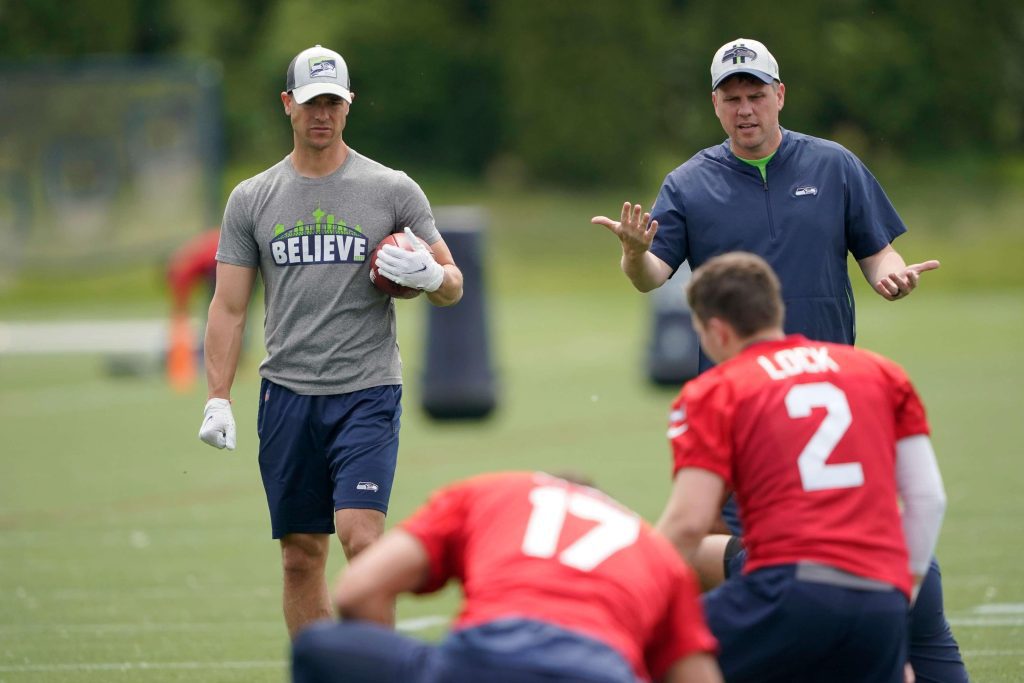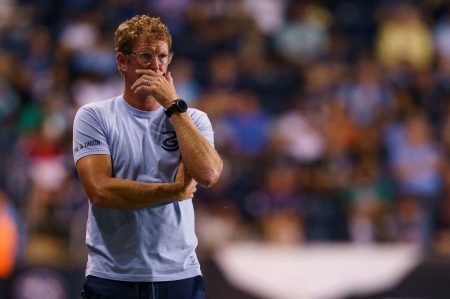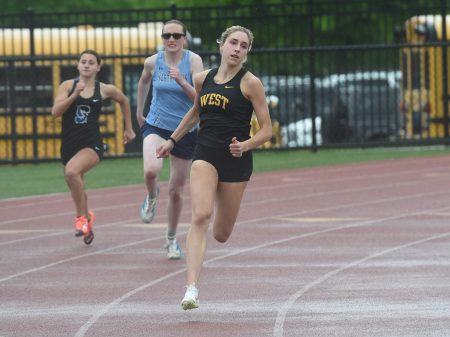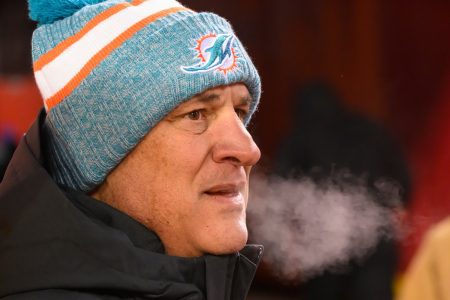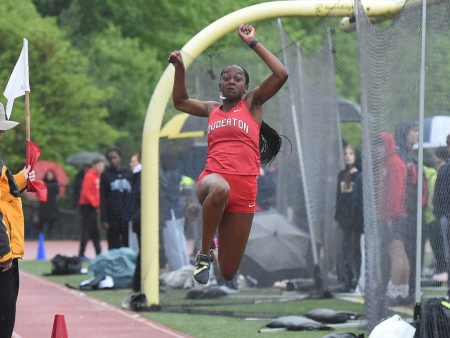Maybe it’s better to start at this point, near the end of the fourth quarter of Week 15 with the Seattle Seahawks losing 17-13 and stuck inside their 10-yard line. The two-minute warning had just passed after the Philadelphia Eagles downed a punt at the Seahawks 8.
After scoring a field goal two possessions earlier, the Seahawks were still in the game but faced a tough challenge against a strong opponent in the late stages of a crucial game. On the sideline at Lumen Field, offensive coordinator Shane Waldron grabbed quarterback Drew Lock — an emergency starter that night due to Geno Smith’s groin injury — and started working.
It was a critical moment in Seattle for a 6-7, playoff-contending team needing a big play on the “Monday Night Football” stage.
The following drive started with an incompletion — a Lock throw over the middle that bounced off tight end Noah Fant’s hands and almost got intercepted. Over the next nine plays, there were a few other close calls too. But the series also included five Lock completions, including a third-and-10 shot up the right sideline to DK Metcalf for 34 yards.
Then, when it really mattered, facing another third-and-long from the Eagles 29, Lock spotted rookie Jaxon Smith-Njigba in single coverage, had the perfect play call from Waldron and threw a game-winning bomb into the end zone with 28 seconds left.
Seahawks 20, Eagles 17.
That was a relatively small moment in a disappointing season for the Seahawks. But for everyone involved, it was a game-on-the-line triumph and represented the kind of resilient, calm and fearless football Waldron wants his unit to play.
Six days later, with Smith back at quarterback, Waldron influenced another game-winning touchdown drive that finished in the final minute, this time a grinding, 14-play, 75-yard march that ended with Smith’s 5-yard pass to Colby Parkinson in a 20-17 road win over the Tennessee Titans.
That marked the second time in NFL history — and the first since 1999 — a team had two quarterbacks throw game-winning touchdown passes in the final minute of regulation in consecutive weeks. And it provided added evidence of Waldron’s ability to adjust and prepare his players for success in the crucial stages of games.
The Chicago Bears hope to utilize those skills and many more with Waldron as their new offensive coordinator. That partnership became official Tuesday. Waldron, 44, will start the next phase of his football journey during a potentially significant time in Bears history.
He will be the offensive visionary tasked with driving the team’s championship pursuit while bringing out the best in whichever quarterback(s) the Bears choose to lead them into 2024 and beyond.
Waldron also will walk into an offensive coordinator’s office at Halas Hall where — with the exception of Adam Gase — the inhabitants almost always leave through a trap door rather than on an up escalator.
The pursuit of consistency
In league circles, Waldron is seen as a rising offensive designer, an intelligent and inventive coach with strong teaching abilities. His work with Smith in Seattle in 2022 is especially notable as the once-overlooked quarterback had a standout year (4,282 passing yards, 30 TDs) en route to earning Pro Bowl honors and the league’s Comeback Player of the Year award.
Waldron has worked under some of the top coaches in the sport. He was with Bill Belichick at the New England Patriots from 2008 to 2009, with Sean McVay at the Los Angeles Rams from 2017 to 2020, and with Pete Carroll in Seattle for the last three seasons.
He was the Rams passing game coordinator for three seasons and Jared Goff’s quarterbacks coach in 2019. He spent one season with Russell Wilson in Seattle before getting Smith ready to be a productive starter for a playoff team in 2022.
When the Bears formally introduce Waldron, he will likely talk about three key principles in his offensive philosophy: the importance of ball security, the need for daily investment in fundamentals to stay sharp, and the necessity of buy-in from the entire group.
Waldron will likely emphasize his commitment to consistency and balance in his offense when he speaks. He aims to establish a strong running game while also embracing an attacking mentality when there are opportunities for explosive plays.
Just like in the two late comeback victories last month, Waldron wants the identity of his offense to reflect composure, determination, and high-level mental toughness.
As a play caller, he will need to build a strong connection with his quarterback, consistently bringing out the best in whoever it may be.
It is presumed that he will have input as the new bosses at Halas Hall work to solve that riddle in the coming weeks and months. This work will involve pre-draft homework and in-house discussions on the developmental progress of Justin Fields.
Fit process
Similar to any coaching hire, it’s natural to first feel hope and have optimistic visions of significant improvements that can lead to a meaningful breakthrough. Waldron’s experience calling plays was a definite positive for the Bears. For general manager Ryan Poles and coach Matt Eberflus, this removes a lot of the uncertainty about how he might handle those duties in Chicago and what kind of productivity they can expect.
However, Eberflus and Poles hired their last offensive coordinator less than two years ago—Luke Getsy in January 2022, which caused a lot of excitement at Halas Hall.
Like Waldron, Getsy was praised as a rising, young offensive coach with high intelligence, proven teaching skills, and impressive creativity. Getsy had been with the Green Bay Packers for six of the previous seven seasons, including three under Matt LaFleur in a Kyle Shanahan/McVay-style offense. He was endorsed by players and coaches as a strong communicator, steadying leader, and sincere, relatable team builder.
Getsy had been Aaron Rodgers’ quarterbacks coach for his MVP seasons in 2020 and 2021. While serving as Mike McCarthy’s receivers coach in 2016 and 2017, he was credited by Davante Adams as influential in his breakthrough.
“He’s been on my radar for a while,” Eberflus said after hiring Getsy, later emphasizing his attraction to the timing-based, quick-decision passing attack Getsy was likely to bring.
For the next two seasons, Getsy was seen as a creative football thinker with strong teamwork skills and a thorough understanding of all the parts of an offense. However, the Bears, under his leadership, also had significant inconsistency issues, and the hoped-for progress for Fields never reached the level the team wanted.
All the good qualities the Bears saw in Getsy didn’t matter enough when his offense too often found itself struggling.
Fields worked really hard to learn a system that wasn't great for him. Getsy’s problem-solving efforts sometimes led Fields away from concepts and plays he was most comfortable with.
It became a frustrating situation. The quarterback was often adapting to the play caller, and the play caller was adjusting to the quarterback. This back-and-forth made it hard for the offense to build momentum or improve, especially in the passing game.
It was a fitting problem. A big one. And it’s a lesson Eberflus and Poles must learn as they try to set up Waldron for success.
Waldron's experience and ability to adapt should help. But with the Bears potentially at a turning point at quarterback, making the offensive vision match the personnel must be a priority as well.
For what it's worth, Waldron’s Seahawks had lower rankings than the Bears this season in total offense, first downs, touchdowns, third-down conversion percentage, and red-zone efficiency. They also had a rushing attack that ranked in the bottom five.
Waldron needs to find ways to make his next offense much more effective. Whatever it takes. He must have solutions and ideas for maximizing his quarterback’s abilities while also playing to the strengths of the supporting cast.
And when the pressure increases? When the Bears face those critical stages of close games? Waldron will be expected to consistently bring out the best in every player in his offense.
The Bears, of course, are looking forward to what’s ahead. Ultimately, Waldron's performance and his ability to help the team's quarterback(s) shine will define his time in Chicago.
()





